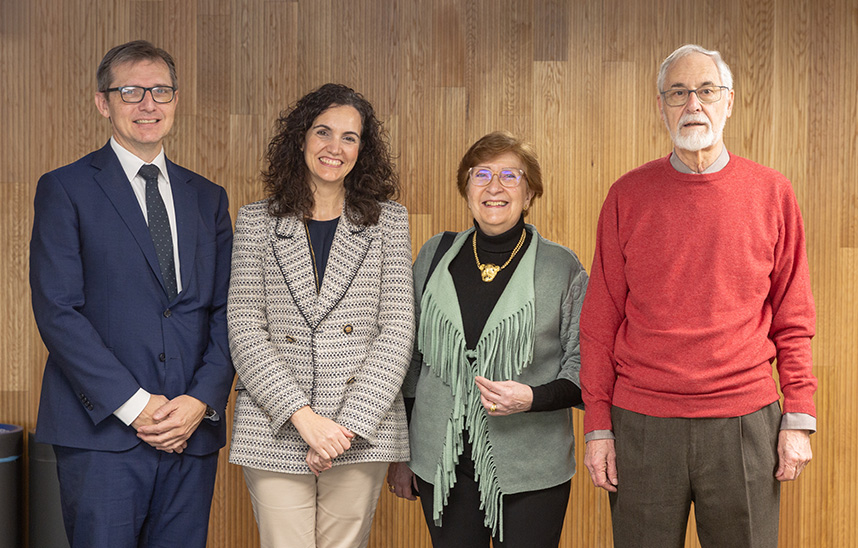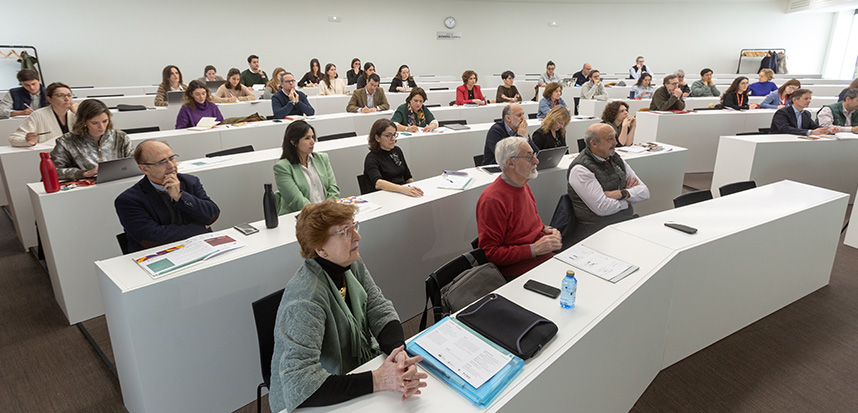seminar on the impact and diffusion of research in society
An analysis of the relationship between scientific entities and society to facilitate the exchange of knowledge and promote its transfer in all areas.

PhotoManuelCastells/From left to right: Alex Hansen, Paloma Grau, Elena Castro and Ignacio Fernández.
The University hosted the first workshop of a program organized by DINA ITC that seeks to promote and discuss the partnership of scientific entities with society. It was the first of three sessions that will be held at the University of Navarra over the coming months and is supported by the administrative office General of Innovation of the Ministry of Science, Innovation and Universities. In addition to the two workshops planned, a hybrid course of about 30 hours will be given focusing on the communication and valorization of the results of research in social sciences and Humanities.
Paloma Grau, Vice President of research and Sustainability of the University of Navarra, opened the session to introduce Elena Castro Martínez, director of the DINA ITC Program, and Ignacio Fernández de Lucio, professor of research ad honorem. Both are attached to INGENIO, a joint institute of committee Superior Institute for Scientific Research (CSIC) and the Polytechnic University of Valencia (UPV).
The Vice President pointed out the importance of hosting this seminar of training for researchers at the University: "The knowledge dissemination of our research is extremely important in the current context. The veracity of information and its transfer plays a fundamental role in the face of the distrust and polarization present in society". He also highlighted the mission statement that the University has in involving citizens, companies and public administrations in the context of knowledge dissemination and transfer of knowledge: "This program reaffirms what we have always been and wanted to be from the beginning. The presence in the social realities of its environment and the service that is generated through the research is in the DNA of the University of Navarra".
Elena Castro explained the objectives of the session: the participation of the academic community in the processes of dynamization and the analysis of the social role of scientific entities. For the researcher, the approach of innovation systems can help to improve the exchange of knowledge in all its areas.
In this line, the manager of the program pointed out that innovation is a collective process in which different types of actors intervene, and its success depends on how they will face the problems of the current context: "The transfer of knowledge is not reduced exclusively to companies, there are more social actors that need the knowledge for their activity, from all subject. They can be public administrations or private actors that do not have as goal to produce profits. There are different actors and many means to reach these users".

The seminar continued with the lecture by Ignacio Fernández de Lucio, who reflected on the way science is done and its evolution over the last few years. In this sense, the workshop was focused on the social valorization of the research and the discussion on the increase and usefulness of the knowledge, emphasizing the importance of interactive models that deepen the relationship between society and the academic community.
In the last block of seminar, three academics from different scientific fields intervened in a roundtable to tell their experiences in the evaluation and social impact of the scientific knowledge from their particular area of research : Sarali Gintsburg (researcher of the Institute for Culture and Society), Jesús de la source Arias (Associate Dean of research and Full Professor of the School of Education and Psychology), and Juan José Pons Izquierdo (Full Professor of the School of Philosophy and Letters).




